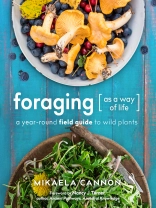Find connection with the land and feed your family locally, seasonally, and sustainably
Nourish your family from nature’s pantry. Foraging as a Way of Life documents twelve months of wildcrafting, featuring five different plants each month for a full year of abundant, local, and seasonal eating. Enhance your sense of self-sufficiency while increasing food security, protecting habitat, and connecting with the land.
Full-color and lavishly illustrated, this accessible, in-depth resource features:
- Accurate and detailed descriptions of herbs, mushrooms, berries, and other wild plants to avoid confusion and inspire confidence when determining plant identification.
- Foraging recipes for remedies, tonics, syrups, and unique handcrafted dishes incorporating wild ingredients—feast on rosehip soup with pan-fried dandelion flowers, followed by birch- bark cookies or chicory chocolate bars.
- Extensive guidance for safe processing or consumption of each species, including cautions, lookalikes, and tips for sustainable harvesting.
Drawing on the author’s field experience and her study of herbalism and ethnobotany, Foraging as a Way of Life is designed to inspire readers to share the exuberance and joy of wild foods while finding nourishment and connection in their local fields or forests. A must for every gardener who would like to gather dinner while weeding, for those wishing to learn sustainable harvesting while hiking, or for anyone who wants to create healthy, foraged meals while living lightly on the planet.
Cuprins
Disclaimer
Territorial Acknowledgment
Foreword by Nancy J. Turner
How to Use This Book
Welcome to This Book
Notes About the Land
A Year of Plants and Mushrooms
SPRING
March Wild Ginger, Weeping Willow, Norway Maple, Kinnikinnick, Early Blue Violet
April Cleavers, Purple Dead Nettle, Oxeye Daisy, Hairy Bittercress, Stinging Nettle
May Dandelion, Asparagus, Prickly Lettuce, Black Elderberry, Catnip
SUMMER
June Red Clover, Salsify, Lamb’s Quarters, Common Mallow, St. John’s Wort
July Saskatoon, Sheep Sorrel, Thimbleberry, Oregon Grape, Black Hawthorn
August Curly Dock, Western Giant Puffball, Chokecherry, White Sweetclover, Plantain
FALL
September Purslane, Common Burdock, Chickweed, White Chanterelle, Lobster Mushroom
October Yarrow, Rosy Gomphidius, Black Walnut, Chicory, Dog Rose
November Late Fall Oyster Mushroom, Large-leaved Avens, Western Mountain Ash, Prince’s Pine, Rocky Mountain Juniper
WINTER
December Field Pennycress, Trembling Aspen, Ponderosa Pine, White Spruce, Western Redcedar
January Lodgepole Pine, Interior Douglas-fir, Beaked Hazel, Western Hemlock, Paper Birch
February Common Barberry, Rocky Mountain Maple, Sulphur Cinquefoil, Black Cottonwood, Lamb’s Ears
Acknowledgments
Glossary
Drawings
References
Websites
Index to Common and Scientific Names
About the Author
About New Society Publishers
Despre autor
Mikaela Cannon facilitates classes, workshops, and hikes focused on responsible foraging and wildcrafting, and is passionate about passing on to the next generation the skills and knowledge required to harvest and prepare wild foods. She and her family raise chickens, sheep, and vegetables on a small organic farm near Armstrong, Canada.












